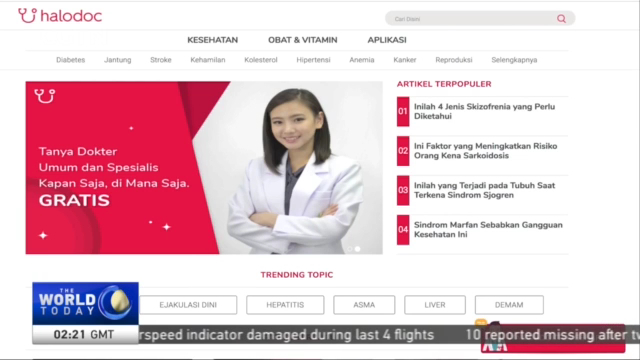
10:50, 06-Nov-2018
Indonesia's On-Demand Healthcare: Digital revolution making a wave in healthcare industry
Updated
09:58, 09-Nov-2018
02:48

Indonesia's healthcare industry is going through a massive digital revolution. What was once a full-day affair, now can take just minutes to get a doctor's consultation. It's all thanks to the major increase of health-related mobile apps and websites that directly connect doctors and patients. But the challenge is getting those same services from big cities to smaller provinces. CGTN's Silkina Ahluwalia has more from Jakarta.
The digital revolution is beginning to transform Indonesia's healthcare industry. In Jakarta, a densely-populated and congested city, the idea of connecting patients and doctors seems mandatory. HaloDoc was founded in 2016. The company saw a gap in the country's local health industry, both online and offline. The website brings together licensed doctors, pharmacies and patients through their platform.
FELICIA KAWILARANG HEAD OF MARKETING, HALODOC "The idea is the app can save time and can save your health before it gets too bad. So we don't try to replace doctors because we don't expect people to consult serious diseases inside our app. Our doctors will still recommend you to a hospital or a doctor they know or a specialist they know. So this is basically just a first stop."
HaloDoc was created with the objective of simplifying access to healthcare. In a country of more than 260 million people, healthcare is anything but simple.
SILKINA AHLUWALIA JAKARTA, INDONESIA "Infrastructure remains a problem in Indonesia. Distribution and delivery of medicines from big cities to remote areas in smaller provinces is still a big challenge for healthcare professionals and the government."
But people living in the outskirts of the country are those most in need of fast and quality healthcare. Apps like Halodoc could be the bridge between those patients and the government.
FADJAR WIBOWO DIGITAL HEALTH PROFESSIONAL "I think Indonesian government could take study first on who provides the service and how they provide it and then make a formula of policies on how they want to regulate this because what we can see the providers are of good quality and maybe for the future we need to make a benchmark and standardization so that everyone could have the same level of standard."
The development of technology has made it easier for medical services like HaloDoc to provide doctors at our fingertips. But as Fajar said, before virtual healthcare can become the norm in Indonesia, the government still needs to introduce regulations to ensure safety between doctors and patients. Silkina Ahluwalia, CGTN, Jakarta.

SITEMAP
Copyright © 2018 CGTN. Beijing ICP prepared NO.16065310-3
Copyright © 2018 CGTN. Beijing ICP prepared NO.16065310-3